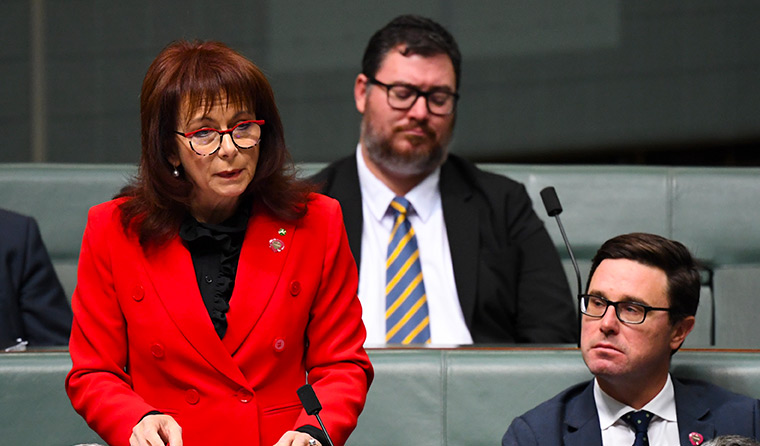News
‘Flexibility and investment’ needed to address rural GP shortage
RACGP Rural Chair Associate Professor Ayman Shenouda has responded to a parliament address about regional health being at a crisis point.
 Associate Professor Shenouda wants ‘a paradigm shift so that the majority of the training happens in the rural area that they are actually seconded to’.
Associate Professor Shenouda wants ‘a paradigm shift so that the majority of the training happens in the rural area that they are actually seconded to’.
‘It’s simply not okay that a person’s location determines their access to health services, and therefore their quality of life. But at the moment, it does.’
Nationals MP Dr Anne Webster delivered an emotional speech in parliament on Wednesday, highlighting the shortfall of doctors in country towns.
In her own Victorian electorate of Mallee, Dr Webster said there is typically one doctor for thousands of patients – which compares poorly to Melbourne, where there is one for every 900 people.
While the coronavirus pandemic has helped speed up changes in rural and remote health with the expansion of telehealth services, the former social worker said there is still a way to go.
‘The government needs to work on getting the settings right so we can address the maldistribution of our nation’s healthcare workforce,’ Dr Webster said.
‘I truly believe in the efficacy of local regional training as a solution to the workforce challenges we face.’

‘It’s simply not okay that a person’s location determines their access to health services, and therefore their quality of life. But at the moment, it does,’ Nationals MP Dr Anne Webster told Parliament this week. (Image: AAP)
RACGP Rural Chair Associate Professor Ayman Shenouda agrees.
He told newsGP the college, as an advocate of rural GPs, is well aware of the disparities that rural communities face in accessing healthcare, and that it is working strategically to address these issues.
The delivery of training rurally to help GPs establish their roots is chief among the RACGP’s efforts.
‘Medical school is about five or six years, then you go to pre-vocational training, and then to vocational training. So this is about 10–15 years of training, the majority of which is now happening in the cities and people are seconded out to rural areas,’ Associate Professor Shenouda, who is also RACGP Vice-President, said.
‘In those 10–15 years, they develop their social network that will support them. You can imagine, if you have all your social networks in a city, no matter how attracted you are to rural communities, you still want to go back to your comfort zone, to people you know.
‘Now we want a paradigm shift so that the majority of the training happens in the rural area that they are actually seconded to.’
The RACGP has also recognised the need for greater flexibility for GPs in training and support for the changing needs of general practice in rural and remote communities.
The college hopes the Rural Generalist program will help to address these issues.
‘It’s not going to sort out everything, but it is part of the solution,’ Associate Professor Shenouda said.
In the interim, however, he said it is important to acknowledge the vital role international medical graduates (IMGs) play in rural communities.
‘Obviously we need to nourish our own graduates to be the future doctors for our country, but until we have the fruits of our strategies, we are still relying on IMGs,’ Associate Professor Shenouda said.
‘As part of the strategy, we need to actually be inclusive of IMGs, who are the backbone of services in rural communities.
‘As a college we need to give them enough education and support for them to do a good job – not put in the worst situations to cope without support and then blame them for outcomes.’
The question raised by Dr Webster is one that harks back to an overarching issue of attracting doctors in training to the field of general practice, according to Associate Professor Ayman Shenouda. This is something he attributes, in part, to a lack of exposure.
‘We might engage with medical students to explain how good general practice is and then we lose them in the first two years of training because they are in hospitals,’ he said. ‘Those are the years where people start deciding on what they want to do in the future – and they are captured by other specialists.
‘So there’s no access to them by GPs.’
One program, which Associate Professor Shenouda said helped to address that but has since ceased, was the PGPPP Program.
‘That’s where three months of your internship or your residency time is spent in general practice. So that gives doctors exposure to general practice and understanding of the art of general practice earlier on,’ he said.
Associate Professor Shenouda says there needs to be greater overall investment in order to ensure there are enough local graduates going into general practice, and taking up rural roles.
‘There is a need for urgent investment from the Government to support the viability of general practice,’ he said.
‘And the value and respect to the profession is very important, too.
‘We want to make the profession attractive again to young doctors, so they aspire to be GPs.’
Log in below to join the conversation.
placements rural health training
newsGP weekly poll
Health practitioners found guilty of sexual misconduct will soon have the finding permanently recorded on their public register record. Do you support this change?